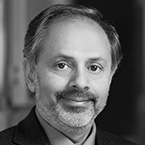
Sanjiv Sam Gambhir, MD, PhD, an AACR member who was considered a pioneer in the field of molecular imaging, died July 18, 2020, at the age of 57.
Gambhir was born on Nov. 23, 1962, in Ambala, India. His family moved to the United States, and he was raised in Phoenix, Arizona. He earned a bachelor’s degree from Arizona State University and his medical and doctoral degrees from the Medical Scientist Training Program at the University of California, Los Angeles (UCLA).
In 1994, Gambhir became an assistant professor of molecular and medical pharmacology at UCLA. He went on to direct UCLA’s Crump Institute for Molecular Imaging. He joined Stanford University in 2003, where his distinguished career culminated in posts as the Virginia and D.K. Ludwig Professor in Cancer Research, director of the Molecular Imaging Program, and chair of the radiology department. At Stanford, he established and led the Canary Center for Cancer Early Detection, a National Cancer Institute-funded cancer nanotechnology center, and the Precision Health and Integrated Diagnostics Center.
Gambhir’s research centered on molecular imaging. With colleagues, he engineered a viral “reporter” gene that was capable of generating images from deep within the body’s cells. This technology proved useful in human gene therapy, CAR-T therapy, and other immunotherapies, improving the ability to gauge efficacy of these emerging cancer treatments. Gambhir’s later research spanned minimally invasive protein and DNA diagnostics, liquid biopsies, and nanotechnology for disease detection.
Gambhir authored nearly 700 peer-reviewed articles and filed for more than 40 patents. Gambhir was founder or cofounder of several biotechnology companies and also served on the scientific advisory boards of multiple companies. He also mentored more than 150 postdoctoral fellows and graduate students.
Gambhir recently received one of Stanford’s highest honors, the Dean’s Medal. Stanford also announced a new endowed professorship in Gambhir’s name. Among other career awards, Gambhir was recognized with the George Charles de Hevesy Nuclear Pioneer Award, the Paul C. Aebersold Award, and the Benedict Cassen Prize from the Society of Nuclear Medicine and Molecular Imaging. He won the Outstanding Researcher Award from the Radiological Society of North America, the Distinguished Clinical Scientist Award from the Doris Duke Charitable Foundation, the Holst Medal, the Tesla Medal from the United Kingdom Royal College of Radiologists, the Hounsfield Medal from Imperial College, London, the J. Allyn Taylor International Prize in Medicine, the Marie Sklodowska-Curie Award from the Institute of Electrical and Electronics Engineers, and the European Society of Molecular Imaging annual award.
He was elected to the National Academy of Medicine in 2008, the American Association for the Advancement of Science in 2014, and the National Academy of Inventors in 2016.
Gambhir joined the AACR in 2009. He spoke at numerous AACR conferences and served on the Annual Meeting Program Committee in 2011, the Clinical Cancer Research Committee in 2012, and the Team Science Award Selection Committee in 2013.
We are deeply saddened by this terrible news. Sanjiv was from my home town in India, and I met him in 2005. He was a great human being who helped thousands of cancer researchers all over the world. He was an exceptional scientist who loved scientific discussion and creative ideas, and he was always full of excitement about scientific discoveries. Although Sanjiv is not with us, his scientific discoveries will continue to help all of us in the field of cancer diagnosis, progression and management, and he will always be remembered. Our heartfelt condolences to his family members. May God keep his soul in peace and bless him with a wonderful new life as we believe in reincarnation.
I am deeply saddened to hear of Sam's passing. He was the most intelligent person I have ever known, and spent so much of his time teaching others to challenge their opinions and ideas, pushing you as far as he knew you could go. He was a rare mix of brilliant and kind, and would go out of his way to do anything for those he cared about. I have looked up to him my entire life, as he was a close friend of my father's, and I have many fond memories of Sam and his family. He inspired me to persue my own career in cancer research, and I will remember him for his passion and drive in the field. He will be greatly missed.
We are standing on the shoulder of giants - and Sam, truly one of those giants not only in imaging but far beyond his field, will be horribly missed. Beyond his accolades mentioned in the article above, everyone who knew him agreed about his humor, kindness and humbleness, that he was a true and terrific mentor going many extra miles to help trainees as well as colleagues in multiple ways. He was the rare combination of a brilliant scientist, a visionary and yet a true Mensch. What an awful loss for the field of imaging, for Medicine, for humanity. I still cannot believe it.